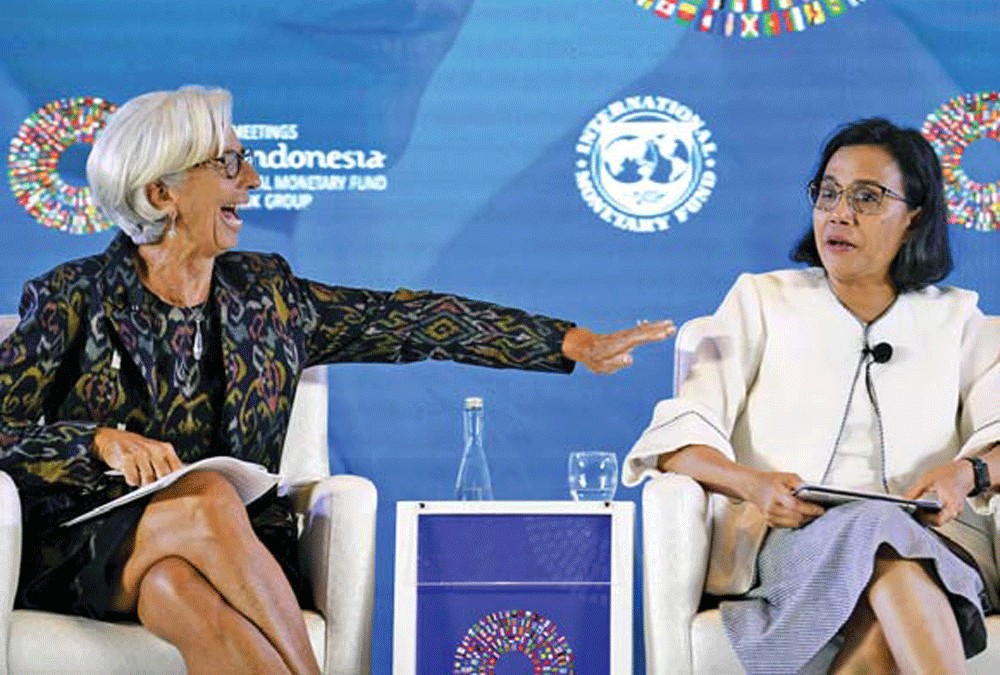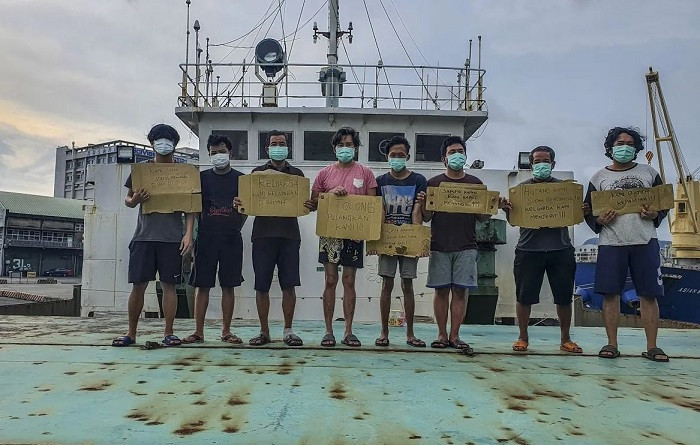Popular Reads
Top Results
Can't find what you're looking for?
View all search resultsPopular Reads
Top Results
Can't find what you're looking for?
View all search resultsPolitical education for women urgent and timely
Change text size
Gift Premium Articles
to Anyone
 Women’s power: Finance Minister Sri Mulyani (right) talks with International Monetary Fund (IMF) chairwoman Christine Lagarde during a seminar on women’s empowerment in the Third World at the 2018 IMF-World Bank Group Annual Meetings at the Bali International Convention Center in Nusa Dua, Bali. (ICom/AM IMF-WBG/Puspa Perwitasari )
Women’s power: Finance Minister Sri Mulyani (right) talks with International Monetary Fund (IMF) chairwoman Christine Lagarde during a seminar on women’s empowerment in the Third World at the 2018 IMF-World Bank Group Annual Meetings at the Bali International Convention Center in Nusa Dua, Bali. (ICom/AM IMF-WBG/Puspa Perwitasari )
F
amilies in Central Sulawesi and Lombok, West Nusa Tenggara, have barely begun to rebuild their lives. With thousands of disaster survivors, many have raised calls to cut short the seven-month political campaign period.
Fears of an unproductive campaign ahead of the April elections were stoked followed the recent brouhaha involving playwright Ratna Sarumpaet, drawing substantial attention away from the disaster survivors in Central Sulawesi.
Flyers created by the Prabowo Subianto-Sandiaga Uno camp, for whom Ratna is a campaigner, called the alleged assault against her a “threat to democracy”. Days later Ratna apologized, admitting her bruises were from plastic surgery. She was dismissed from the campaign team and arrested on charges of spreading lies before she was able to leave the country for Chile for an arts event.
Along with the ensuing mockery aimed at Ratna, as well as the anger and sadness expressed by Prabowo’s supporters, many voiced the lesson learned by all: let’s check and recheck every “report”, especially provocative ones. Excellent!
But the scandal also reminds us of the extra work that women face in order to be heard, such as the feared shakier ground women must stand on when claiming abuse. Another concern is regarding women’s role in politics as aspirants for elected positions, campaigners and voters. Both issues concern credibility, with women having to fight harder than men for recognition.
At least until next April, intense public civic education would do much to equip women as well-informed and credible electoral aspirants, campaigners and voters. Among nearly 188 million eligible voters in Indonesia, more than half or 94 million are women, slightly more than men. Almost 8,000 candidates from 20 political parties are contesting the 575 seats at the House of Representatives, including 3,194 women (against 4,774 men).
Today, 14 percent of the 560 House members are women, or 79 — the 30 percent female quota is only for legislative candidates. But better political education would at least ensure improved knowledge and awareness among all those elected for public office of their responsibilities.
So, let’s use the time available to have a more informed electorate than before — whoever is elected and whether people will vote or not.
In a video broadcast last year on IKnow Politics, an educational platform on politics from United Nations Women, Indonesian lawmaker Irine Putri said that for today’s generation, “equality is something normal”.
Yet, reality shows otherwise; workforce figures still show female participation hovering at around 50 percent throughout the past decades. The other half are not exactly cruising the malls or lounging at home, so Finance Minister Sri Mulyani Indrawati recently raised the need for paying housework, mostly done by women.
Many doubt Sri Mulyani was serious, but it’s high time a new policy addresses inequality.
Cooking and childcare are important work, but bargaining power goes with a paycheck. Being busy at home cannot mean women ignore matters that concern them. Education, including on constitutional citizens’ rights and responsibilities, would encourage, for instance, housewives to speak up in community meetings on their preferred allocation of their village or subdistrict funds.
“We need political education” on a massive scale, said Azriana, chairperson of the National Commission on Violence against Women (Komnas Perempuan), during the commission’s 20th anniversary recently.
As things stand, we have many clueless candidates and voters, as confirmed by a recent survey conducted by the Pew Research Center in several countries, including Indonesia. In every election, voters have said that at best, they scoured for information on candidates at the last minute, if at all.
Likewise, political parties have recruited popular figures both as campaigners and candidates, with a very loose screening process of track records, as the Ratna incident suggested. Like voters in the Philippines, we push celebrities into politics and then decry less qualified politicians.
Many are impatient about reforms as we gained freedom 20 years ago. But both older and younger voters lack political education, while women advocates say the poorest women who are breadwinners, including widows, are among the most invisible citizens, and thus most are unaware of their rights and how to access them.
Worse, since 1998, grassroots political education has declined. Activists have become busy pursuing new policies, Azriana said, like the 30 percent quota for women legislative candidates, while “we assumed that access to information was getting easier”.
It soon became clear that “social media can be a tool for lies”, and that at the grassroots level, public education was still needed despite technological advances, she told The Jakarta Post.
To address their needs, local groups filled in the gap to educate their communities, such as farmers’ groups. Komnas Perempuan presented at its anniversary honors for human rights defenders, including for Rosad, the widow of Ibu Patmi from Mount Kendeng in West Java. It is believed that Ibu Patmi died from exhaustion after joining protests in front of the State Palace, in which women sat silently with their feet planted in cement, rallying against a planned cement plant in Central Java.
Widespread neglect of civic education at the grassroots also led to “public space being taken over by certain groups” spreading fundamentalism and intolerance, Azriana said.
In Azriana’s home province of Aceh, Rosdiana, a lecturer at Banda Aceh’s Ar Raniry State Islamic Institute, learns that even academics are not free to provoke students’ minds. After it became known that she had taken students to a church to learn about Christianity, she became infamous and was given one weekend class “when few people were around campus”, she said. She told me she may take up an offer to lecture elsewhere, but she is also expected to lie low.
Given all the odds against them, each elected woman raises hopes. Afridawati of the Aceh Party was elected deputy regent of Simeulue Island in the last local elections. Recently, Bekasi Regent Neneng Hasanah was the latest female executive to be arrested by the Corruption Eradication Commission (KPK) for what many say is a “normal” practice of accepting bribes.
Earlier described as “religious” and “honest”, Neneng, a medical graduate from a reputable private Jakarta university, remains innocent until convicted.
Her case deals another blow to the struggle to have more good female decision makers. There is no choice but to continue the work to train women as citizens and voters. Beyond repeating the message to vote for women, trainers should remember to instill the understanding that accepting bribes is unacceptable.
***
The author is a staff writer at The Jakarta Post.










